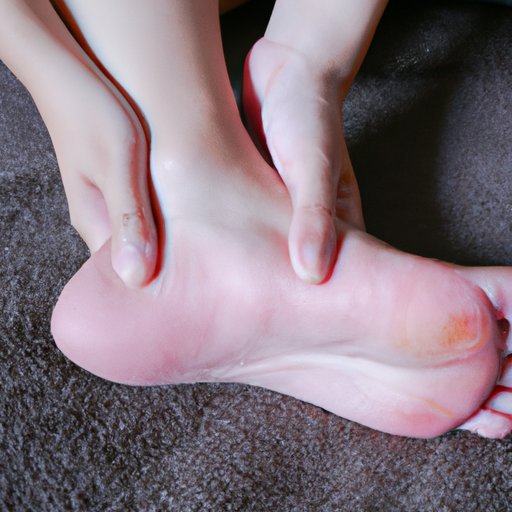
I. Introduction
Pain on top of the foot can be caused due to various reasons, such as improper footwear, injuries, or aging. This condition, if left unchecked, can lead to difficulty in walking and relevant discomfort. In this guide, we aim to provide a comprehensive outline of how you can get rid of the pain on top of the foot through both medical and natural means.
II. Stretching exercises
Stretching exercises are some of the easiest and most natural ways to alleviate pain on top of the foot. The following exercises can be performed daily:
Toe stretch: Stand while holding on to a wall or chair with your feet pointing straight ahead. Curl your toes under and hold the position for ten seconds. Next, straighten your toes and hold for another ten seconds. Repeat ten times.
Towel stretch: Sit on a chair with your feet flat on the ground. Place a towel underneath your toes and grip the towel with your toes. Now, while holding the towel, pull your toes towards your body and hold for fifteen seconds. Repeat ten times.
Plantar fascia stretch: Sit in a chair and place the affected foot on top of the knee of the opposite leg. Hold the heel of the affected foot with one hand and the ball of the foot with the other hand. Gently stretch your foot and hold for fifteen seconds. Repeat ten times.
Stretching exercises can improve foot flexibility, increase blood flow, and relieve tension in the muscles, helping to eliminate the pain on top of the foot.
III. Change in footwear
Wearing the wrong kinds of shoes can cause pain on top of the foot. Tight shoes, high heels, or shoes without proper support are the most common culprits.
For those who experience foot pain, it is best to look for shoes with padded soles and moldable insoles that offer proper support. It is also essential to choose shoes that provide ample space for your toes to move inside them. Sports shoes with shock-absorbing soles are often an excellent choice since they cushion your feet and reduce the impact of pressure when walking or running.
Wearing comfortable and supportive shoes can prevent and reduce pain on top of the foot.
IV. Ice treatment
Applying ice to the affected area can reduce swelling and inflammation, which can lead to a reduction in pain on top of the foot.
Ice pack: Take a bag of frozen peas or a cold gel pack and wrap it around the affected area. Leave the ice pack on for 15-20 minutes. Avoid direct contact of the ice with the skin, as it can cause ice burns. If necessary, place a thin towel between the affected area and the ice pack.
This treatment can be done two to four times a day until the pain has reduced significantly.
V. Physical therapy
If the pain on top of the foot persists, you may want to consider consulting a physical therapist. Physical therapists can help enhance foot strength and flexibility so that you can enjoy a better range of movement. Additionally, physical therapy can relieve symptoms of various foot conditions.
Physical therapy treatments may include gait analysis, exercise prescriptions, balance/coordination exercises, microcurrent therapy, and neuromuscular re-education.
If you want to seek help from a physical therapist, make sure to consult your doctor first. Your doctor may be able to refer you to an expert.
VI. Massage therapy
Massage therapy has also been shown to be effective in managing foot pain. Massage therapy can help relieve discomfort by increasing blood flow and reducing tension in the muscles. Different massage techniques that can be used include:
Deep tissue massage: involves applying deep pressure to the affected tissue. This pressure treatment can be painful, but it can provide you with long-term relief.
Trigger point massage: involves identifying and working on the specific trigger points that cause pain on top of the foot. The therapist will apply pressure to these points to release tension and provide relief.
If you want to try massage therapy, make sure to find a certified and experienced massage therapist who can help you manage your pain.
VII. Over-the-counter medication
If natural remedies do not work, there are many over-the-counter medications that can help reduce pain on top of the foot. Nonsteroidal anti-inflammatory drugs (NSAIDs) such as aspirin, naproxen sodium, and ibuprofen can reduce swelling and inflammation and can provide pain relief.
It is essential to follow dosage instructions when using these medications as long-term use can lead to stomach ulcers and other severe health consequences. Additionally, if you have health issues such as high blood pressure, kidney disease, or stomach ulcers, you should consult your doctor before taking any medication.
VIII. Consult a doctor
If the pain on top of the foot persists despite trying the treatments mentioned above, seek medical attention right away. The doctor may perform some tests, including x-rays or blood tests, to determine the cause of the pain. The following tests may be performed:
X-rays: provide an image of the bones in your foot and can show any damage or fractures.
Blood tests: can detect inflammation or infection in the body.
MRI: can provide detailed images of the bones, ligaments, and tendons in your foot, providing a more precise diagnosis.
Your doctor may recommend further treatment, such as cortisone injections or surgery, depending on your diagnosis.
IX. Conclusion
Pain on top of the foot can be a troublesome and painful condition. However, with some effort and the right management technique, it is possible to relieve the pain and continue with your daily activities. Remember to make sure you are wearing proper footwear, perform stretching exercises, apply ice treatment, seek physical or massage therapy if necessary, and consult your doctor if the pain persists.





